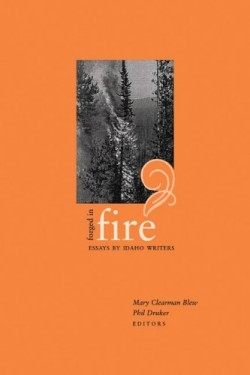Forged in Fire
Essays by Idaho Writers
For all twenty writers in this new collection of essays, fire is, inevitably, a metaphor. The metaphors change, however, depending on the writers’ experiences; while some experiences are similar, especially the ones that involve fighting forest fires, each storyteller here brings a unique turn to the subject by dint of his or her individual imagination or philosophy.
Four of the writers, two of them women, have worked fighting fires at least seasonally. In Jenny Emery Davidson’s “Holding the Line,” the young female college student finds a way to connect with the manly men who surround her on her fire crew. Lori Messenger in “Ignition” is a female firefighter who wants to have a baby and must face up to the controversy that sometimes plagues women who want to take on motherhood on the fire line. Both essays engage the reader by sharing a world that can be just as tedious as it is exciting.
For Robert Coker Johnson, another writer with firefighting experience, the decision to fight fires professionally has great personal meaning, in his essay “What I Know of Fire.” As a young boy, he suffered from third-degree burns after becoming mesmerized by a pile of burning leaves. In another essay, Robert McCarl’s “Black Butte Jump,” it isn’t fire itself that brings danger, but the life that surrounds fire. A smoke-jumper, McCarl watches helplessly as one of his fellow jumpers is injured during a practice jump from an airplane. Even in its absence, fire shapes defining moments.
Although not all the stories take place in Idaho—not all the writers have some bond to the Gem State—the ones that do take place there resonate with the state’s fiery history. The fires of 1910 and 2000 come up in more than one essay, as well as the story of Edward Pulaski, inventor of an integral tool for fighting fires (a combination axe and pick). Because of this history, each summer, ranchers, farmers, wilderness scientists, and ordinary Idahoans apprehensively watch the ground go dry and the sky light up with electrical storms. One shot of lightning is enough to send people like Kim Barnes into action, making calls on their phone tree. Living in the backcountry, she and her family don’t expect help during a lightning fire near their home on the Clearwater River. She recounts, in “The Ashes of August,” a 2002 Pushcart Prize winning essay, the way that fighting the fire creates a sense of community with her neighbors.
Most of the authors in this collection have been previously published, and it shows. Writing styles do vary, from quick page-turners to slow-moving meditations, but for those with an interest in the state of Idaho or in the alchemy of fire, this is a fine collection.
Reviewed by
Olivia Boler
Disclosure: This article is not an endorsement, but a review. The publisher of this book provided free copies of the book to have their book reviewed by a professional reviewer. No fee was paid by the publisher for this review. Foreword Reviews only recommends books that we love. Foreword Magazine, Inc. is disclosing this in accordance with the Federal Trade Commission’s 16 CFR, Part 255.

